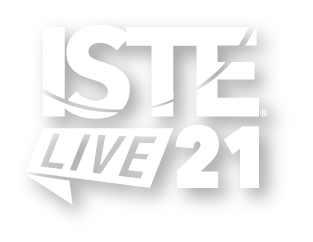

Call to Action for the Future of Technology Infusion in Teacher Preparation |
Listen and learn : Panel
Dr. Arlene Borthwick Dr. Teresa Foulger Dr. Kevin Graziano Laurie Guyon Dr. Dennis McElroy Ji Soo Song Dr. Joseph South
Learn about action steps for nationwide collaboration and networking for technology infusion in teacher preparation. Discussion will include ways to involve key stakeholders including state and district leaders, the federal government, NGOs and colleges/schools of education in five key areas to ensure TPACK-ready teacher candidates. See how the pandemic has made the role of each stakeholder group in this ecosystem even more important.
| Audience: | Teacher education/higher ed faculty |
| Skill level: | Beginner |
| Attendee devices: | Devices not needed |
| Topic: | Teacher education |
| Grade level: | Community college/university |
| Subject area: | Career and technical education |
| ISTE Standards: | For Education Leaders: Visionary Planner
|
| Additional detail: | ISTE author presentation |
The purpose of this session is to support attendees in championing technology infusion in their organizations through networking and collaboration with external stakeholders, including district, state, federal government, and NGOs.
(5 min) Welcome & Introductions (Dennis McElroy)
(3 min) Connection of this session to the book, Championing Technology Infusion in Teacher Preparation: A Framework for Supporting Future Educators. (Kevin Graziano and Arlene Borthwick)
(4 min) A New Vision: Technology integration is different from technology infusion. (Teresa Foulger)
(15 min) Solution-Oriented Approach: Five key areas that stakeholders from the public, private, and nonprofit sections can collaboratively engage to systematically and sustainably improve tech-infused teacher preparation programs. (Joseph South and Ji Soo Song)
(15 min) Context-Specific Solutions: Break-out conversations for participants to strategize use of the tools based on their specific needs and context. Conversations facilitated by presenters and hosts.
(5 min) Sharing and Closing Remarks (Laurie Guyon and Dennis McElroy)
The presenters will present research findings from their book and other sources.

Arlene Borthwick, co-editor of Championing Technology Infusion in Teacher Preparation: A Framework for Supporting Future Educators (ISTE, 2020), is Professor Emerita and former Associate Dean and Professor at the National College of Education, National Louis University in Chicago. She has served as chair of the American Association of Colleges of Teacher Education’s Committee on Innovation and Technology and member of the ISTE Board of Directors. She received the ISTE “Making IT Happen” award in 2008.

Teresa S. Foulger is an associate professor at Arizona State University where she has championed technology infusion. Teresa’s vision for supporting teacher educators led to a co-authored international collaborative study that resulted in the Teacher Educator Technology Competencies. Her technology infusion research has been awarded the 2014 Journal of Digital Learning and Teacher Education Research Award, the AACTE Award for the Innovative Use of Technology in 2009 and 2017, and the ISTE Research Paper Award in 2012 and 2019. Dr. Foulger is a Past President of ISTE TEN and is a recipient of the Making IT Happen award.

Kevin is a contributor/co-editor of Championing Technology Infusion in Teacher Preparation: A Framework for Supporting Future Educators, and a Professor of Teacher Education at Nevada State College. Kevin has co-authored international research that led to the development of the Teacher Educator Technology Competencies (TETCs). He has served as the chair of the Consultative Council for SITE, the chair AACTE’s Committee on Innovation and Technology, and the co-chair of SITE’s mobile learning SIG. Kevin is the editor of CITE- General. He is also a contributor/co-editor of Online Teaching in K-12: Models, Methods, and Best Practices for Teachers and Administrators.


Laurie was named CoSN's NextGen: Emerging EdTech Leaders for 2020. She is an ISTE Certified Educator and in the first DigCit Institute Global Impactor Cohort. Laurie is on the NYSCATE Social Media Team and Volunteer Hall of Fame and leadership teams ISTETEN, ISTESTEM, and ISTEDSN. She is Google Cloud Certified and a Google Certified Trainer. She is an ambassador for Common Sense, Buncee, Seesaw, Nearpod Pionear, Sphero Hero, Kami Hero, Genially, Wakelet, 3D Bear, IORAD, Osmo, and Screencastify Master Screencaster. Laurie was an adjunct professor for SUNY Plattsburgh where she taught Digital Age Learning.

Dr. Dennis McElroy is Professor Emeritus from Graceland University in Lamoni, Iowa. He is the 2020-21 ISTE Teacher Education Network PLN President. Dennis is an Apple Educator, technology advocate, and passionate teacher educator. His career has included time serving as a high school science teacher, technology director, Iowa DOE technology consultant, school board member, and university professor. In his free time he is a devoted father and grandfather as well as a gigging musician.

Ji Soo Song is an advocate committed to promoting educational equity. As the senior policy and advocacy associate at ISTE, he leads the research, analysis, and communication of federal, state, and local policy issues related to digital learning standards, educator credentialing systems, and professional development funding streams. Ji Soo also serves as a member of the Title IV-A Coalition's Board of Directors. Prior to ISTE, Ji Soo served as a City Year AmeriCorps Member in the District of Columbia and a fellow at the U.S. Department of Education's Office of Educational Technology.

Joseph South is a national educational technology leader focused on evidence-based learning transformation. He presently serves as the chief learning officer at ISTE. He formerly served as director of the Office of Educational Technology at the U.S. Department of Education. In this role he advised the Secretary of Education, developed national educational technology policy, formed public-private partnerships to assist state and local education leaders in transitioning to digital learning, helped school districts expand the use of openly licensed educational resources (OERs), and collaborated to nurture a robust ecosystem of edtech entrepreneurs and innovators.